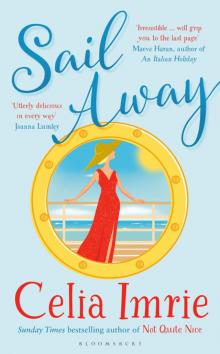- Home
- Celia Imrie
Nice Work (If You Can Get It) Page 3
Nice Work (If You Can Get It) Read online
Page 3
Carol was doing a very bad job of looking cheerful, but even her face betrayed the disillusion she felt. She was realising the absolute folly of having signed before checking. ‘He told me it was all new.’
‘Then he was a total liar,’ said William, holding his hands tight to his chest, as though frightened that if he touched anything he would get leprosy. ‘And you, as per usual, were a silly dupe.’
‘There’s a cellar too,’ said Carol in desperation. ‘Good for storing wine, and all that.’ She reached into her black and white handbag and pulled out a key.
‘I wonder how many corpses we’ll find buried down there,’ said Benjamin, wincing as he squeezed through an open door leading out to the back yard.
Carol unlocked a rickety door, and moved her hands around inside searching for a light switch. She flicked it and there was a loud pop as all the other lamps around them fizzled out.
‘Surprise, surprise!’ said William. ‘The electrics are kaput as well. Well, I’m certainly not going down there to get eaten alive by rats and fleas and heaven knows what else.’
‘I have a light,’ said Benjamin, pulling a matchbook from his trouser pocket.
William shot him a look. Benjamin had only recently come out of rehab for a drug problem and it was obvious that William had an idea possessing matches might be drug-related.
‘Thank you, Benjamin.’ Theresa whipped the matchbook smartly out of his hands and walked past him. If William and Benjamin were going to have a row, Theresa would prefer them to have it in their own time. ‘They’ll be very useful.’
She tore a match from the pad and struck it, then, tentatively, step by step, made her way down the creaking wooden staircase into the darkness. Just as a cobweb brushed her face the match burned down to her nail, and she yelped.
‘Are you all right down there?’ called Carol from the top of the steps.
‘Fine, thanks,’ said Theresa, wondering why she was the one who was doing all the scary work, especially as she wasn’t even in on the project.
She wiped her face, then lit another match and continued her descent.
The cellar was not damp, but it was very dusty and looked tiny.
‘It’s not very big,’ she cried.
Just as Theresa struck match three and reached the bottom step, a wobbly beam lit the cellar from behind. Carol came quickly down the wooden steps.
‘I am now the proud possessor of a “J’adore Bellevue-Sur-Mer” flashlight.’
Carol pointed the beam into the darkness. Now Theresa saw why the place had seemed so small. What she had perceived as a brown wall was a stack of large cardboard boxes.
‘I wonder what these can be?’ said Carol in her thick American drawl.
‘Probably lots more lovely novelty gifts,’ said Theresa. ‘At least you’ll never run out of “I heart Bellevue-Sur-Mer” tea towels.’
‘What’s going on down there?’ William called from the top of the steps.
‘If you’re so interested, come down yourself,’ said Carol, digging again in her handbag so that a small beam of light was bouncing all over the floor.
‘We’ve had enough of this, Carol.’ William wrapped his jacket tightly round himself. ‘You can do what you want. Benjamin and I are going home to do some serious thinking about pulling out of this entire project.’
‘Please yourself,’ said Carol. ‘I’ve been madly impulsive, I know, but it’s my signature on the contract, so I’m the one who’ll be liable.’
Theresa could tell that the plan looked like disintegrating or becoming a dreadful millstone round their necks. She could not see how this horrible shop could ever become the cosy little bistro she had been imagining for them all.
‘Hold this,’ said Carol, thrusting the torch into Theresa’s hand. ‘I do have a gorgeous Swiss army knife in here somewhere.’ After a few seconds more, Carol pulled the knife from the bottom of her bag, quickly flicked open a blade and brandished it in the air. ‘Twenty-one functions and at last I’ve found a reason to use it – apart from opening wine bottles, that is.’
She applied the knife to the top of a four-foot-high carton. Once the cut was made, Theresa helped her pull open the flaps. After removing some wedges of polystyrene padding, all that they could see was a flat stainless-steel surface.
‘What is that?’ whispered Carol.
‘We’ll have to get the lot off, I think.’ Theresa ripped a large strip of cardboard from the side and threw it behind her. Carol joined her and the two tugged, pulled and tore until they had exposed the contents of the box – a brand-new top-quality industrial German oven.
It was an omen, Theresa believed. What good was her money just sitting in a bank? Wouldn’t it be more fun to be part of a team, working here, cooking up a storm and maybe, if they were lucky, making a little profit? What else was she going to do with her days? Sit in her armchair and read the papers, and shuffle around in her slippers? What could be worse than that? She might be getting old but that didn’t mean she had to give up trying. She wanted to fill her days with rewarding work. This job would be a real challenge. Risky, perhaps, but there was always excitement in taking a risk.
Theresa made up her mind there and then to join the restaurant team.
4
‘I don’t understand.’ Sally hunched up in the wheelhouse of a tiny fishing boat that ran on a small outboard motor. ‘Why on earth do you need me to help you with this?’
Jean-Philippe smiled serenely as he swung the wheel round and pushed the throttle, taking the boat up to maximum speed as they pulled out of the harbour and into the bay.
‘I saw you there all alone, and I thought I would like you to join me,’ he said. ‘And, to be truthful, I was let down by someone else.’
Sally felt a little scared. She only knew the man through lessons at his sea school. She knew nothing of his personal life. What if he was a serial killer or rapist?
She hadn’t questioned his offer at all and now here she was out at sea with him in control. But unlike the distant days of her helmsman instruction, there would be no record of this journey. She was utterly at his mercy.
Sally smiled and tightened the buckle on her life jacket. ‘Shall I take the helm?’ she said.
Jean-Philippe shook his head. ‘You don’t know where I’m taking you,’ he replied, opening the throttle and riding into a huge oncoming wave. ‘It’s the most exclusive place I’ve ever been to.’
Sally put her head down and made herself extremely busy tidying up the ropes on the rubber fenders.
The small boat took another swerve and was now heading due east.
How many private coves and secret inlets were there along this coast? wondered Sally. How many locked-up estates owned by absentee Russians, Germans, Arabs and Americans where the landing stages led to hidden caves and dark grottoes?
Jean-Philippe pointed. ‘That’s where we’re heading.’
They had been navigating the waves with a fair wind behind them for probably forty-five minutes, Sally estimated. Suddenly she could see a vast cream house perched on a rocky promontory. All the shutters were closed. The villa was surrounded by a high wrought-iron fence topped with sharp-looking golden spearheads.
‘It’s all locked up,’ said Sally.
‘I know. All the better for what we have to do.’ Jean-Philippe touched Sally’s shoulder. ‘Take the wheel, please, while I put out the fenders,’ he said.
Trying to keep her eyes on him, Sally steered towards the little stone jetty, taking down the speed and running the boat alongside.
She cut the engine.
Jean-Philippe jumped out and wound the fore-line around an iron capstan.
Sally pocketed the keys and threw him the other line.
He held out a hand and helped her on to the concrete landing.
‘Follow me!’ he ordered, marching away towards a small pine wood behind the house.
Sally started undoing her life jacket but he turned and shouted, ‘Keep that on. It will be ne
cessary.’
She tried to feel for her mobile phone in her jeans pocket, just in case, but the life jacket was in the way. If she needed to grab for her phone, she couldn’t.
‘Allez, allez,’ Jean-Philippe slapped his thigh. ‘We’re late as it is.’
With some trepidation Sally followed him into the dark copse.
He was walking very fast, so she had to run to keep up with him, then quite suddenly they both emerged from the trees, temporarily blinded by the strong sunlight.
Jean-Philippe stood with his hands on his hips and tossed his head. ‘Well, what do you think?’
All Sally could see ahead was a large white wall.
She looked up and from side to side.
‘This is the baby we are taking for a test run.’
Sally gaped and realised that the white wall was in fact the side of a huge super-yacht.
‘But I thought . . . ?’
‘You didn’t think that I needed help with that tiny launch? Non, this is a private motor-yacht, which we’re going to put through her paces.’
Sally couldn’t believe her eyes. It was the largest motor cruiser she had ever seen up close.
‘What is this?’ she asked. ‘A three-million super-yacht?’
Jean-Philippe pouted. ‘Perhaps more. Seven million-plus.’
‘Whose is it? A rock star’s?’
He laughed. ‘Not many rock stars would bother with this beauty.’
‘Then who?’
‘She’s owned by a Russian zillionaire. Just sold by the owners of the villa behind us.’
‘Good Lord!’ Sally bit her lower lip. ‘And he’s trusting you and me to take her out to sea?’
‘Uh-huh,’ said Jean-Philippe. ‘Let’s get busy.’
Sally sat at the helm of the mega-yacht.
She felt like a mini-toy, one of those tiny plastic people they put into architects’ landscape plans to make the false look real.
Jean-Philippe had walked her around the yacht. Together they explored its four decks and impressive en-suite staterooms, the grand dining room with vast plasma screen and incredible sound system, the swimming pool and jacuzzi, the cosy cocktail bar, the sunbathing decks, the galley – which looked like a luxury kitchen and was three times as big as Sally’s own kitchen. When they reached a large nursery with all kinds of rocking horses and teddy bears, Sally asked how many kids the new owner had.
‘None, as far as I know,’ replied Jean-Philippe. ‘But, with his money, no doubt within a week this will be converted into a disco.’
Sally laughed. ‘To lure the young ladies he meets on the beaches, I suppose.’
‘I imagine his reputation would be lure enough. He’s a famous playboy, I’m told. Son of one of Russia’s richest oligarchs. Plus of course – and the real reason I am so excited – he just bought my favourite football team: Walsingham Wanderers.’ Jean-Philippe chuckled. ‘I would like very much to be invited to drinks one night when he has Monsieur David Beckham aboard, or Monsieur Mickey MacDonald. Mon Dieu, my heroes of le foot!’
‘I’m sorry; you’ve lost me. I don’t follow football.’ Sally sat on a cream leather chair, trying to pump up the height so that she could actually see through the multiple windscreens. Around her were so many electronic displays, each showing a different thing – radar, sea depth, fishing shoals, satnav maps and charts . . . and the rest – that she didn’t know where to look. It was more like NASA HQ than a boat. What’s more, before this, the largest boat she had ever seen was her own 28-foot sports boat, which had nothing more than a key, two thrust handles and a small radar display.
From her position, balanced on the edge of the seat, holding a small steering joystick, the sea seemed so far away.
‘Jean-Philippe? Do you really know how to get this thing moving?’
Sally could see that Jean-Philippe himself appeared to be rather fazed by the size of the boat and its complex controls. He was kneeling, slowly moving along from screen to screen, inspecting each of them one by one.
‘What happens if we crash it?’
Jean-Philippe made a small noise from the back of his throat, then said calmly, ‘We only have to take it to Cannes and back.’
‘What do we do in Cannes?’ asked Sally. ‘Please don’t say we have to take it into that port and try to moor it with all the tourists staring up at us.’
‘No,’ said Jean-Philippe. ‘We have to pull in, pick up the owner and take him out for a run.’
‘If he’s rich enough to own this, he must already have a team of people to drive it, doesn’t he?’
‘That’s the thing,’ said Jean-Philippe, taking the other helm seat, at last happy that he recognised the purpose of all the controls. ‘He only bought the boat yesterday. He hasn’t even seen it yet.’
Sally was open-mouthed. ‘How could anyone buy something so enormous as this before even going aboard?’
‘I’m told he made a lot of money by buying some painting, a Van Gogh or a Matisse or a Picasso, or something really famous like that. He put it into a bank vault for five years, then took it out and made a cool twenty million. He bought this with the change.’
Sally sighed. ‘To those that have . . . Though I rather disapprove of paintings being locked in the dark and used only as investments, don’t you?’
‘I don’t think about it.’ Jean-Philippe shrugged, turned some knobs and flicked some switches on the massive control panel. ‘Your disdain would show on your face, and you end up losing the job.’
Sally apologised.
‘Don’t worry. In this case, hopefully he will be so busy exploring his new baby that he won’t be that interested in what we’re doing. But we’ll both get a good day’s pay out of it.’
Jean-Philippe turned on the engines.
‘Now, Madame Sally – you can choose whether to stay here at the controls, or go out and cast off.’
Sally made her way out on to the aft deck.
5
Theresa was in her worst clothes, complete with apron and rubber gloves, clearing rubbish into an area near the front door, ready for collection. She couldn’t believe how Carol could make even dungarees look glamorous. She was decked out like a modern-day Hollywood version of Rosie the Riveter, in blue jumpsuit and red and white polka-dotted headscarf. A transistor radio in the adjacent shop was blasting out French pop songs and Carol was happily singing along.
‘Those two boys are such wimps,’ Carol said, tearing open a cardboard box and pulling out a handful of coloured plastic windmills. ‘Look at all the marvellous stuff we have to find a home for!’ She whirled around making the sails spin. ‘Do you think there’s a children’s orphanage near here or somewhere that would like them?’
Theresa looked around at all the piles of postcards, badges, T-shirts and ornamental ashtrays. ‘It would certainly be nicer to find someone who’d like to have a bit of fun with all this rather than just dump it in a skip with the rotten stuff.’
Theresa was on her knees ready to start pulling up the hardboard beneath the lino to see how the floor looked underneath. Carol knelt behind her.
‘Let’s do this,’ said Theresa.
‘Please God, let it be parquet,’ said Carol.
‘One two three – pull.’
The two women stared down at a dusty grey surface.
‘What is that? Concrete?’
‘I’m not sure,’ said Theresa, turning around in her squatting position to grab a dustpan and brush.
‘I’ll need to make use of another lovely souvenir flashlight key-fob,’ said Carol, jumping to her feet and rifling through a nearby box. ‘Here.’
She handed Theresa the tiny torch and together they yanked the board up again. Theresa gave the exposed area a quick dust-off, then Carol turned on the beam.
Both women gasped.
‘Is it real?’ Carol knocked it with the end of the torch.
‘It’s beautiful,’ said Theresa, running her fingers along the surface of a turquoise mosaic floor. ‘Quit
e modern-looking,’ she said with a sigh of relief. ‘I don’t think we’ll have the archaeologists down here shutting the place down for months while they dig for Roman artefacts.’
‘Cover it up again.’ Carol dropped the end of the lino. ‘It’s a lovely colour, that blue. We could match the décor to that floor and create quite a cool ambience.’
Theresa smoothed the lino back down into the corners. ‘And we certainly want it well protected when we get the old kitchen stuff dragged out.’
‘I think it’s time for a tea break, darling,’ said Carol. ‘We’ll have this room empty by aperitif time, so let’s get the men in to clear the kitchen later, then we can spend the whole week scrubbing and painting it, ready for the electricians to put in the new equipment.’
Theresa agreed. It was important to get the kitchen installed as soon as possible so that all the necessary certificates could be obtained.
‘Let’s spend an hour at my place, phoning plumbers and electricians.’
‘And we’ll see whether there are any local shops who might like the old stuff.’
‘And if no one wants to pay us for it, let’s give it to a charity.’
Carol thrust out her hand. ‘Let’s shake, partner! To the restaurant. What shall we call it, by the way?’
‘Thinking caps on!’
The two women shook.
Stanislav Serafim stood waiting on the quay at Cannes. He was in his fifties, six foot tall, with black hair and dazzling blue eyes. He had one of those sly Sean Connery smiles, the lips slightly cocked upwards on one side, a perfect physique – and decked out, by the look of the sleek cut, from head to toe in Armani.
Sally quite melted at the sight of him.
She threw out a rope for him to catch and loop round a capstan.
He grabbed it, then, to her surprise, instead of tying it, simply leapt aboard.
From all her sea-going lessons she knew he had just broken a golden rule. She wondered whether Jean-Philippe would have given him a telling-off?
Once aboard, Mr Serafim reached out to take her hand. Did she imagine it or did he give her a little wink?
‘It’s as beautiful as I imagined,’ he said in excellent English.

 A Nice Cup of Tea
A Nice Cup of Tea Nice Work (If You Can Get It)
Nice Work (If You Can Get It) Not Quite Nice
Not Quite Nice Sail Away
Sail Away